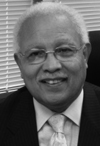|
|

|
Just Symposium marks 10th year milestone
|
 Dr. Sidney McNairy Jr. Dr. Sidney McNairy Jr.
There are those life-changing moments that come that forever mark a
person. For Dr. Sidney A. McNairy Jr., of the National Institutes of
Health, one of those moments came when he was bogged down in his
graduate studies, but got an opportunity to go to the Mall in
Washington, D.C., to hear a speech.
The speech was by Martin Luther King, Jr. with the theme “I Have a Dream.”
It was a moment when McNairy, who was pursuing his doctorate in
biochemistry at Purdue University and juggling courses in everything
from biochemistry and organic chemistry to endocrinology and
human physiology, grasped the broader meaning of his studies. It’s one
reason why he will be speaking on the topic, “Science for the Sake of
Science or Humanity,” at MUSC’s 10th Annual Ernest E. Just Symposium
Feb. 26.
“I selected the subject of my presentation for the budding scientists
so that they will be awakened to the fact that science has a role
greater than simple discoveries, but has equally as important a role in
the betterment of mankind.”
Co-organizer of the symposium Titus Reaves, Ph.D., said MUSC is
commemorating this being the 10th year milestone of the event by
featuring McNairy as its first Ernest Just lecturer. Reaves, assistant
professor in the department of cell biology and anatomy, said he has
enjoyed seeing the growth of the event and watching its impact on the
university. The first symposium was attended by 15 to 20 students, as
compared to 185 last year. He’s expecting even more this year.
The symposium serves to celebrate the scientific accomplishments of
Just, Ph.D., a pioneering African-American scholar, setting his life’s
experiences as a role model for students. The symposium attracts the
top scientists, who present their research related to Just’s work. It
also helps to recruit students to one of the university’s six colleges
of graduate medical education, said Reaves.
“We are beginning to see students accepted into our university as a
result of the Ernest Just Symposium. Over the last few years, we have
had scientists at the top of their respective areas and undergraduate
students from the states of South Carolina, North Carolina, Georgia,
Florida and Maryland.”
McNairy, Ph.D., and D.Sc., said the symposium is important in that it
stresses the life and legacy of Just, a scientist whose research in
marine biology made him one of the giants in developmental biology.
“One of the greatest challenges that we must always face as a nation is
diversity or inclusion of all Americans,” said McNairy. “A prime
example as to why we must is the life and legacy that Ernest Just left
for us. Even from very difficult circumstances during a very
challenging period for African- Americans in American history, he rose
far above his humble beginnings in South Carolina. Having had to leave
South Carolina to seek an education in New Hampshire, Dartmouth
University and the University of Chicago, he left his mark on
developmental biology as the father of parthenogenesis.”
McNairy is leaving his own legacy.
The associate director for research infrastructure for the
National Center for Research Resources began his career as a professor
of biochemistry and a visiting scientist at several
pharmaceutical companies and the Centers for Disease Control and
Prevention. He said he knew that his life’s journey would take him to a
place where he could implement a philosophy whose mission was to evolve
new knowledge for the betterment of mankind. In 1974 that came to pass
as he began his federal career as a health scientist administrator at
the National Institutes of Health. He went on to become a driving force
behind the success of a number of innovative federal grant programs
that have helped strengthen biomedical research infrastructure at
universities and colleges, as well as research foundations throughout
the nation.
McNairy said that during his career he has seen a number of seminal
discoveries, two of which stand out—the alpha helix and the mapping of
the human genome.
“I, like others, may have thought the latter was indeed the ‘holy
grail,’ only to be met with the fact that the mapping of the human
genome was simply opening the door to many scientific questions and
challenges. The challenges that the biomedical scientists now face are
even greater than before. Mapping of the human genome has made it clear
that personalized medicine is very much within research, even though it
is much in its infancy. To accomplish this, biomedical sciences must
embrace all disciplines.”
For information on other speakers, visit http://www.musc.edu/grad/just/index.html. For information on Just’s biography, visit http://www.musc.edu/grad/just/Biography.htm.
Friday, Feb. 26, 2010
|
|
|



